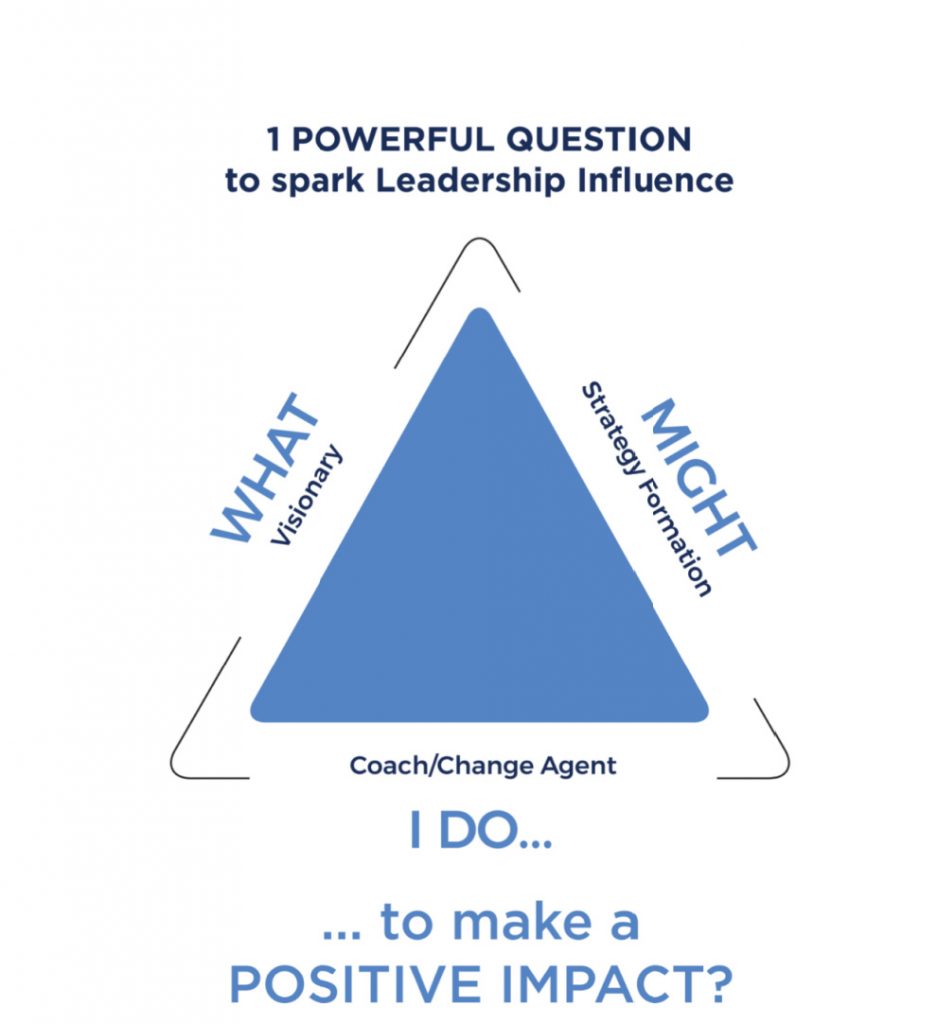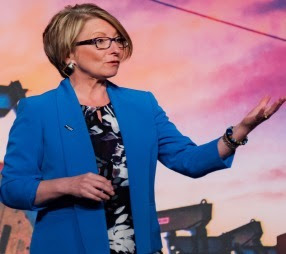
4 Steps to Create a Trust Triangle that Drives Your Sales Growth Strategy (5 of 5)
“I don’t have time for fluff! I need a new sales growth strategy for my business!”
I’m talking to Graham, the owner of a software development company. I hear the panic in his voice. “It’s more difficult than ever to get new business. Prospects are hesitant to spend money. The economy seems unpredictable.”
I ask a few more questions and listen to his concerns. Then, I talk about “trust” and “making a positive impact.” Over Zoom, I see him frown. That’s when he says, “I don’t have time for fluff!”
As a sales leader, do you echo Graham’s sentiments?
I agree with Graham. The digital disruption started long before the Covid Craziness hit our shores, and continues to escalate. No leader has time for fluff!
And that’s part of the problem. Graham doesn’t realize it, but his current sales initiative has a lot of fluff in it – he’s stuck in a Sales UN-culture.
During our conversation, we discover that his sales systems, processes, and staffing don’t support a pathway to sales growth success. These weaknesses might not be so apparent in a different economy or marketplace, but now, the weaknesses are glaring. He also sees it. He’s afraid and doesn’t know what to do. The health pandemic is aggravated by the Fear Pandemic.
Living and working in a Sales UN-culture, creates formidable challenges. After all, you’re facing UN-precedented challenges, and continuous UN-certainty and disruption.
To survive the onslaughts you encounter on many fronts, it’s easy to become exclusively focused on saving your business.
The owner fears his or her business won’t survive. The salesperson fears they might lose their job. The client fears spending money!
When we decide, based on fear, our vision is distorted. We often concentrate on the immediate crisis, instead of focusing on what really matters. Yet, it’s focusing on what’s important that can calm those we lead.
Might there be one solution for all of Graham’s sales growth challenges?
Watch this Video: Making a Positive Impact is About Sales Growth and More
In this series, we’re talking about the 5 Bold Leadership Decisions and a power-packed question that leaders might ask themselves, as well as their sales teams, to find solutions for daunting challenges.
Here’s the power-packed question that is filled with leadership development potential:
“What might I do to make a positive impact?”
Let’s discuss the final phrase of our question,
“…to make a positive impact.”
Leaders who have an Impact Mindset and focus on contributing to others, achieve extraordinary results.
However, we often hear people complain, “Everyone seems to be so UN-kind these days! They’re all focused on their own survival and not caring about others.”
What might you do to turn this trend around?
Create a Sales Growth Trust Triangle
A lack of trust developed because Graham’s salespeople saw that he was focused on tackling the fires of today and not laying out a long-term leadership development strategy for the team. They thought his only goal was to make a profit. He didn’t trust them to get the results to grow the business. This mutual distrust negatively impacted the sales growth results.
What might leaders like Graham do to show the salespeople that he is worth following?
Here are 4 steps that I suggested to Graham. I invite you to use them to create a Trust Triangle in your business. Then you can look forward to a win-win-win scenario.
Trust Triangle Step #1: Use your Strategic Roles to Build Trust that Impacts Your Sales Growth
As our conversation progressed, I invited Graham to ask himself this compelling leadership question:
What might I do to empower my sales team and to be a trusted leader worth following?
I reminded Graham of the four critical strategic roles that build trust between leaders and their teams.
Trusted leaders are…
-
- Vision-Casters – They ask “what” questions that invite salespeople to focus on the future vs. becoming stuck in the “why’s” of the past.
- Strategy Formulators – They ask “might” questions to inspire their salespeople to create innovative strategies to explore new products and new markets.
- Coaches – They develop the capacity of the team to take ownership and reach their full potential.
- Change Agents – They inspire salespeople to take the action needed to move forward with visionary plans.
Use all your roles, as a vision-caster, a strategy formulator, a coach, and a change agent, to build trust to fight the Fear Pandemic. Then you’ll develop salespeople who overcome their fears so that they can do what’s best for their clients.
Trust Triangle Step #2: Build Relationships of Trust to Impact Leadership Development
Graham and I worked on re-igniting a business vision, mission, values, and virtues plan. He dug deep, doing this introspective work so that he was aligned with his purpose – an objective that goes deeper than increased revenues.
As he became more aligned with his Personal Purpose – what he’s passionate about, he learned how that might be lived out through the Business Vision and Mission. Now his focus is also more focused, strategic, intentional…building trust with his staff. Most importantly, he is sharing his own journey with his team and using it as a coaching opportunity.
Graham discovered that building trust doesn’t happen overnight. He had to show the salespeople that his daily actions aligned with his words.
During coaching conversations and Sales Strategy Meetings he started…
-
- Asking questions that invite free and open discussion.
- Listening well to what is being said without interrupting or jumping to conclusions.
- Inviting creative ideas, even if they seem a little crazy.
- Valuing the salesperson as an individual and not just a number on the payroll.
- Creating opportunities for their personal and professional development.
Graham was excited to see that by making a bold leadership decision his own mindset shift positively impacted his Millennial salespeople. And, it showed in the sales figures.
When considering how to manage Millennials, what other actions would you take to build a relationship of trust?
Trust Triangle Step #3: Fight the Lack-of-Purpose Virus that Kills Sales Growth

Whether Graham (and other leaders) want to hear it or not, this generation is determined to do something that benefits the world. However, many aren’t sure what that “something” is just yet. They might think that it means volunteering to feed the world. Others want to help the homeless. And, that’s all good! But the non-profit world isn’t the only way to get meaning and purpose.
You can help them figure out how their ordinary work can become extraordinary by learning more about them.
-
- What are your employees’ skills and talents?
- What is their unique call in life?
- What gives them purpose through each day?
It’s important to provide your salespeople with opportunities to leverage those talents. By doing this, you empower them to use their talents to benefit your business as well as reach their personal goals. Tap into what makes these individuals unique. Then use that to tie into your company’s vision.
Here are proven leadership development strategies that Graham used to align the goals and dreams of his salespeople to his vision for the business:
-
- Provide regular, timely, and positive feedback on how they’re doing and where they need to stretch and grow.
- Offer intentional career development that is tied to their vision of success. They grow in their capacities and develop skills for the future.
- Embrace a company culture that values them as an entire human being, allowing them to blend work-life with their personal life.
- Communicate clearly about how their work makes a difference in the company.
- Commit to developing a shared vision for giving back to the community and helping others.
Another resource that Graham used, was my e-book, Energize Your Dreams. Here he found the questions and structure he needed to create alignment between the team’s dreams and goals and his business vision. If you want a copy, email me at Danita@danitabye.com.
What might you do to create opportunities where your salespeople can make an impact on the lives of others?
Trust Triangle Step #4: Coaching Salespeople to be Trusted Resources Improves your Sales Growth
Graham had another big concern. His clients were even more reluctant than before to part with their money. They too are gripped by the Fear Pandemic. Will they have enough money next month, next year? The fear of the unknown prevents them from doing what is necessary to grow their business. With all the UN-certainty in the world, that’s understandable.
We worked on a coaching strategy to strengthen the relationship between his salespeople and their clients.
Graham regularly coaches his salespeople on the importance of being a trusted resource. He encourages them to embrace these characteristics. They are adapted from The Trusted Advisor, by Maister, Green, and Galford.
As a trusted person, you:
-
- Are consistent and dependable
- Can be relied on to tell clients the truth
- Are on the clients’ side and always seem to have their best interests at heart
- Are always honorable in words and actions
- Act like a real person, not someone in a role
- Allow clients the latitude to think; you don’t just give your conclusions
- Are constantly finding new ways to be of greater service
- Are committed to doing the next right thing
How did this coaching strategy make a positive impact on Graham’s sales growth results?
His salespeople are intentional in uncovering the root problems of their clients. They address the client’s fears that might be holding them back. They’re charting a product and/or service solution that is good for their client in the long run.
The result? Graham’s clients experience less stress and anxiety about the buying process. They are more loyal, and less buyer resistant, and sales growth is impacted positively.
Graham’s salespeople are not ignoring the client’s feelings of fear. They talk about it and work on solutions. By doing what’s good for the company and what’s good for the client, Graham and his team are set for success!
Invest Time to Create a New Sales Growth Culture
As the year ends, we often reflect on our failures and successes. For some, exciting new opportunities unfolded. For others, their challenges seemed overwhelming, even insurmountable. The Fear Pandemic is claiming many victims and we are called to stand up against the toxic, destructive impact.
This scripture reminds me of the importance of making a positive impact on the lives of others, especially during demanding times.
Hebrews 10:24 (NIV) And let us consider how we may spur one another on toward love and good deeds.
Remember our question, “What might I do to make a positive impact?”
Watch this video: How to Use this One Question to Tap into 5 Success Mindsets
I’m happy to say that Graham actively contributes to the lives of his sales team…and he knows that it isn’t just “fluff.” It’s an important and ongoing part of his leadership development and sales growth strategy.
Leaders who model trust, inspire their salespeople to become trusted resources for their clients. Those clients trust the sales organization, the leader, and the salespeople with their time and money.
Be intentional in spotting how your ordinary work will become extraordinary times to serve others. Then you’re making a positive impact – on yourself, your salespeople, and your clients.
Like Graham, you can make a bold leadership decision to create a triple-win scenario…
Your leadership matters greatly during this season.
To read all the articles in this series, 5 Bold Leadership Decisions to Get You on a Sales Growth Track, click on each word:
Stay tuned for the summary post of this series. We’ll do a recap of the 5 Mindsets you need to become radically relevant, highly competitive, and wildly successful, regardless of market and economic disruption.
Sales Growth Leadership Lesson: Leaders with an Impact Mindset and focus on contributing to others, achieve extraordinary results.
Sales Growth Leadership Question: What might you do to challenge your salespeople to see that their ordinary work can become extraordinary?
Let’s discuss a tailor-made talk to meet your specific needs.
Virtual speaking event? No problem!
Check out my Speaker page HERE.
To schedule a call contact me at danita@danitabye.com




No Comments